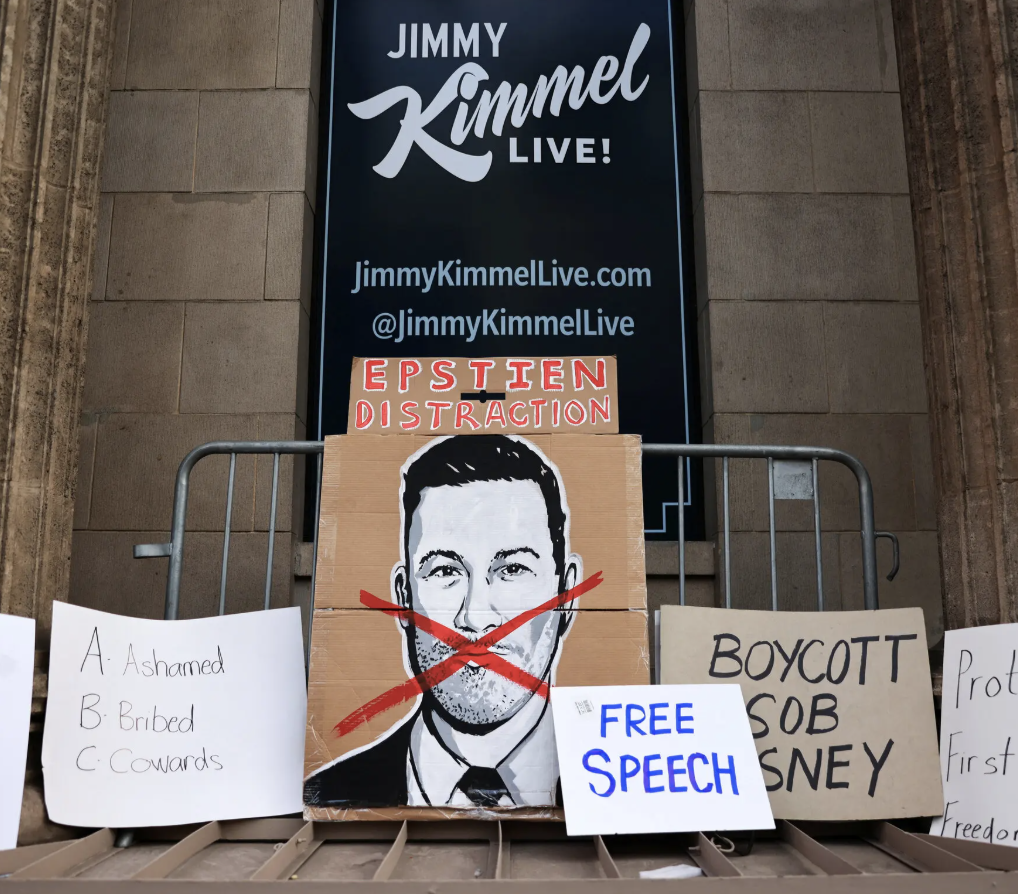
David Swanson/NYT photographer
Signs of protest in front of Jimmy Kimmel's office.
On September 23, Jimmy Kimmel returned to Jimmy Kimmel Live! after a six-day suspension that put national attention on what “free speech” means in 2025. His monologue was part apology for any misunderstanding that his words on air the week before may have caused, as well as part criticism of those who tried to silence him. He called government pressure to drop his show and silence the voices of comedians “anti-American.” Kimmel’s ordeal, alongside an eerily similar incident with Stephen Colbert’s The Late Show, reveals how precarious free speech has become with the influence of modern-day politics and corporate interests.
Kimmel’s suspension came after remarks surrounding the assassination of conservative activist Charlie Kirk. Kimmel said on-air that the “MAGA gang” was trying to reframe the shooter as “anything other than one of them.” Subsequently, Trump-appointed FCC chairman Brendan Carr publicly warned of regulatory consequences if ABC didn’t carry out consequences. Soon after, major ABC affiliates Sinclair and Nexstar announced they would pull Kimmel’s show from their schedules and have yet to air his return to their broadcast. ABC responded by suspending Kimmel indefinitely just hours after Carr’s remarks.
Jurisdictionally, the FCC does not have constitutional power to censor speech, but many observers saw Carr’s warnings as a means of coercive censorship to bend the decisions of private corporations. Free speech laws generally protect against government suppression, as enshrined by the First Amendment, but when government leans on agencies to silence dissent, the line blurs.
Weeks earlier, Colbert’s Late Show was canceled by CBS under controversial circumstances. Many critics argue the show’s cancellation followed pressure on CBS as a consequence of a settlement with the Trump administration and a looming FCC review of the parent company’s merger details. Subsequently, Colbert revived his old hyper-patriotic Colbert Report persona to satirize the idea that talk shows must present a state-approved message to their audiences. The broader late-night community rallied behind Kimmel and Colbert. Jon Stewart, John Oliver, Seth Meyers, and others made pointed remarks about how regimes that fear satire often try to muzzle it.
Adding fuel to the fire, President Trump himself suggested while speaking to reporters on Air Force One that networks airing “disrespectful” late-night content might not deserve to keep their broadcasting licenses. He remarked that “maybe their license should be taken away” if they continued to mock the president and give him “bad publicity.”
The remark was extraordinary, not only because of its bluntness, but also because it revived an authoritarian sentiment that the First Amendment was designed to restrain. In the United States, licenses are not awarded based on political loyalty, and the government cannot constitutionally revoke them simply for speech critical of those in power.
Satire has historically been the medium in which the people’s true opinions are voiced, functioning as a democratic safeguard against tyranny and authoritarianism. In the modern age, comedians have picked up its hilt, using humor to articulate ideas that politicians and journalists may be too fearful to publicize. Attempts to suppress programs like Jimmy Kimmel Live! and The Late Show undermine their roles in the societal ecosystem by equating their criticism with disloyalty.
Looking to history, scholars of authoritarianism often note that regimes begin targeting freedoms of expression, such as the censorship of art under the Soviet Union or the Republic of Türkiye’s Article 299 of its Penal Code, which makes it illegal to “insult the President of Turkey.”
The United States is far from these examples, and I hope that it will remain so well into the future, but the recent events surrounding the freedom of speech have demonstrated how humor has become an indicator of democratic health. When leaders react to satire with regulatory threats, they signal an intolerance of dissent that is culturally detrimental.
The pressures on satire mirror broader trends across universities and liberal arts institutions, which have faced political and financial attacks for fostering spaces of critical inquiry under the Trump administration. Political and legislative campaigns aimed at attacking academic freedom and defunding universities, such as Trump’s letter to the University of California in a plan to make universities more “conservative,” illustrate the increasing politicization of thought and expression.
When our nation’s centers of discussion and thought are intimidated into silence, it puts the country’s basis of democracy and foundational values at risk.